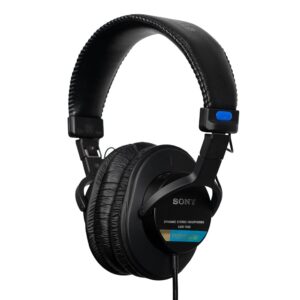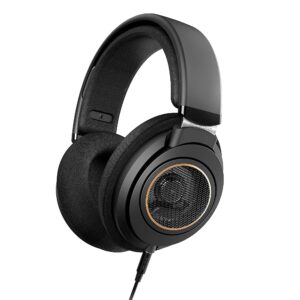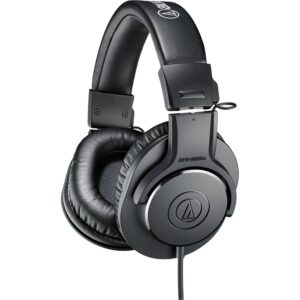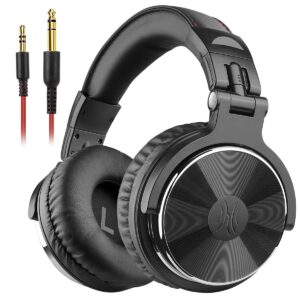We independently select all products and services. If you click through links we provide, Mighty Deals may earn a commission.
Listening to classical music can be an immersive and rewarding experience, especially with the right pair of headphones. Unlike other genres, classical music demands headphones that excel in clarity, tonal balance, and soundstage to capture the intricate details of an orchestra or solo performance. Whether you’re rediscovering symphonies or savoring string quartets, the right headphones bring out the artistry and emotion behind every note.
When it comes to choosing headphones for classical music, there are a few key factors to consider. Audio quality is paramount, so look for models with a wide frequency range and detailed resolution. A spacious soundstage is crucial for experiencing the full depth and separation of instruments. Comfort also plays a significant role, especially for long listening sessions. Open-back designs may provide a more natural sound, though they might not suit noisy environments.
With so many options available, it can be challenging to find headphones that deliver exceptional sound for classical music while fitting your preferences. We tested numerous models to identify the ones that bring out the richness and clarity classical music deserves.
Best Headphones for Classical Music
Our curated list features the best headphones to enhance your classical music experience.
1. Sony MDR-7506 Headphones
A great pick for anyone seeking detailed, balanced sound for classical music listening or professional audio work.
Pros
- Clear, balanced sound perfect for classical music lovers.
- Comfortable fit for extended listening sessions.
- Sturdy design with foldable portability.
Cons
- Non-detachable cord can be limiting.
- Ear cushions may wear out over time.
- Lacks noise-canceling technology.
If accuracy and detail in sound are what you’re after, these headphones deliver in spades. We noticed the clarity of strings, woodwinds, and vocals really shines with the MDR-7506, offering an enjoyable and transparent listening experience for classical music enthusiasts. The sound balance leans more toward neutrality, which helps reveal the subtle details in orchestral pieces.
Comfort is another standout feature. The padded headband and cushioned ear cups made long listening sessions easier, though the snug fit may feel a bit tight for some. The over-ear design also isolates external noises well enough to enjoy quiet passages without distractions, though it doesn’t eliminate noise completely.
While the rugged build inspires confidence, the included 9.8-foot coiled cord might not suit those preferring a wireless option. That said, the foldable frame and soft carrying case make them great for on-the-go use. Despite a few minor drawbacks, these remain a solid choice for anyone serious about high-quality music listening.
2. Philips SHP9600 Headphones
If you enjoy spacious, immersive sound and comfortable long listening sessions, these headphones are an excellent choice for classical music enthusiasts.
Pros
- Clear, balanced audio with detailed highs and mids
- Comfortable for extended use due to breathable ear cushions
- Durable steel-reinforced headband adds reliability
Cons
- Open-back design may leak sound outward
- Lacks noise cancellation for noisy environments
- Cable can feel cumbersome due to its length
When we tested the Philips SHP9600, the first thing that stood out was the open-back design. It created a beautifully wide soundstage that made orchestral pieces feel like we were right in the middle of the concert hall. The 50mm drivers struck an impressive balance, handling bass, midrange, and treble notes with clarity and precision. Every instrument had its moment to shine.
The comfort was another highlight. The ear cups are soft and breathable, which kept us comfortable even during long listening sessions. The padded headband doesn’t exert too much pressure, and the sturdy steel-reinforced build gave us confidence in its durability. We didn’t feel fatigued wearing these for hours, which is essential for enjoying longer symphonies or recordings.
On the downside, the open-back design means these aren’t ideal if you’re listening in shared or noisy spaces. Sound leakage is noticeable, and there’s no noise isolation to block out ambient distractions. Additionally, while the cable is detachable, its length might be inconvenient if you’re sitting close to your device. Despite this, for home listening, these headphones are outstanding in delivering an authentic and immersive listening experience.
3. Audio-Technica ATH-M20x Studio Headphones
These headphones offer a solid blend of comfort, sound clarity, and value for anyone listening to classical music.
Pros
- Delivers clear, well-balanced audio with particularly smooth lows.
- Extremely lightweight and comfortable even during long listening sessions.
- Rarely causes sound leakage, making them ideal for quieter environments.
Cons
- The tight fit can feel a bit uncomfortable after a while.
- Long cable can be tricky in casual settings.
- Not the most visually appealing design.
We tested these headphones with some of our favorite classical pieces, and the audio performance was detailed and pleasant. The lows are well-boosted without overpowering the mids and highs, ensuring orchestral music sounds rich and balanced. They bring out subtle details, such as the crisp notes of the violin or the deep resonance of a cello.
The comfort was impressive, thanks to the lightweight design and soft ear cushions. They stayed securely in place, and the build quality felt sturdy without adding unnecessary bulk. However, the snug fit could become a bit bothersome after longer sessions, particularly in warm settings.
When it comes to practicality, these headphones have a few quirks. The cable length is great for working in a studio but can be inconvenient for casual use or commuting. For serious listening at home, though, they performed remarkably well in isolating sound from outside distractions, letting us focus entirely on the music.
4. OneOdio Wired Over Ear Headphones
If you’re a classical music enthusiast looking for a budget-friendly option with solid sound and comfort, this is a reliable choice.
Pros
- Balanced audio with clear highs and deep bass
- Comfortable ear cushions for extended use
- Swiveling ear cups are great for flexibility
Cons
- Bulky design may not suit frequent travelers
- Noise isolation isn’t the strongest in noisy environments
- Ear fatigue can set in after long sessions
The OneOdio headphones deliver an enjoyable audio experience for classical music. The balanced stereo sound brings out the subtle details in instruments like violins and pianos, while the bass remains controlled and not overpowering. The clarity in the mids and highs ensures we catch every nuance in orchestral soundtracks.
Comfort is one of the highlights as the padded ear cushions make long listening sessions enjoyable. We also found the adjustable headband easy to fit, so everyone in the house could use it without hassle. The swiveling ear cups are handy when we quickly need one ear free, a small but thoughtful feature.
On the downside, their size can feel a bit cumbersome for travel. They also don’t block out a lot of external noise, so these aren’t ideal for crowded or noisy spaces. After a few hours, we noticed some ear fatigue, which might be worth considering if you plan to use them all day. Despite these, for the price and performance, they’re worth a look for casual and dedicated listeners alike.
Buying Guide
What to Look for in Headphones for Classical Music
When choosing headphones for classical music, we should focus on features that highlight the subtle details and dynamic range of this genre. Classical music often relies on balanced and accurate sound representation, so certain factors stand out.
1. Sound Quality:
A neutral sound profile is crucial. We want headphones that do not boost bass or treble excessively but instead provide a crisp, authentic listening experience. Look for clear mids and highs to capture string and wind instruments’ nuances.
2. Comfort for Long Listening Sessions:
Classical pieces often run long. It’s important for headphones to have soft ear padding, an adjustable headband, and a lightweight build to minimize discomfort during extended use.
3. Design Type:
- Open-back headphones allow for a natural and roomy sound, ideal for orchestral pieces, but they may leak sound.
- Closed-back headphones offer better sound isolation, which is great for private listening in noisy environments.
4. Frequency Response:
A wider frequency range (e.g., 20 Hz to 20 kHz or more) helps us enjoy deep bass notes from an organ and the sparkling highs of a violin concerto.
5. Build Quality and Durability:
If we plan to use them regularly, sturdy materials and quality construction become essential. Look for metal-reinforced headbands and durable cushions.
6. Connectivity Options:
Wired headphones often produce better, uncompressed sound quality, while wireless options provide flexibility. If we opt for wireless, battery life and audio latency should be considered.
| Feature | Importance |
|---|---|
| Neutral Sound | Balance and clarity |
| Comfortable Fit | Long sessions |
| Wide Frequency | Range of detail |
| Quality Build | Longevity |
By focusing on these features, we can find headphones that enhance our enjoyment of classical music.
Frequently Asked Questions
Choosing headphones for classical music involves understanding sound quality, comfort, and design preferences. Let’s address common questions to help pinpoint the ideal choice.
What features should I look for in headphones when listening to classical music?
When listening to classical music, detailed and accurate sound reproduction is essential. We should prioritize headphones with a wide frequency range and clean mid-tones to capture nuances in vocals and instruments. Look for models with balanced bass to avoid overpowering delicate melodies and harmonics.
Comfort is also crucial for extended listening sessions. Adjustable headbands and padded ear cups keep the experience enjoyable. Noise isolation may help immerse us in the music, particularly in noisy environments.
Which wireless headphones are recommended for classical music aficionados?
Wireless headphones with high-quality audio codecs like aptX or LDAC are recommended, as they ensure minimal compression and an authentic listening experience. Over-ear models often deliver better soundstage and depth, which are key for classical pieces.
Top brands like Sony and Sennheiser offer wireless models that combine functionality with refined sound reproduction. We should also consider battery life and Bluetooth stability for seamless listening.
Which headphones under $200 offer the best experience for classical music?
Under $200, many headphones provide excellent sound tailored to classical genres. Open-back models often produce greater spatial sound, ideal for orchestras and symphonies. Brands like Audio-Technica and Beyerdynamic offer such options within this price range.
Closed-back headphones in this category can also deliver impressive sound clarity. We may find models with solid noise isolation and durable construction that enhance value.
Are closed-back headphones suitable for listening to classical music, and if so, which are the best?
Closed-back headphones are suitable for classical music, particularly in settings where background noise is present. Though less expansive in soundstage than open-back models, they ensure privacy and focused listening.
Some highly-recommended closed-back options include the Sennheiser HD 569 and AKG K371. These provide balanced sound profiles and accurate reproduction, supporting a rich classical experience.
What are the top budget-friendly headphones that don’t compromise on classical music quality?
Budget-friendly headphones offering quality sound can be found among brands like Philips and Samson. Models like the Philips SHP9500 feature an open-back design with excellent audio detail for a low price.
While inexpensive, these options often deliver solid frequency balance and durability, making them reliable for classical music listening. We should compare options to ensure they align with our comfort and performance needs.
How do wired headphones compare to wireless ones for the fidelity of classical music?
Wired headphones generally offer superior fidelity due to direct audio transmission. This ensures no audio artifacts or compression, making them ideal for detailed and layered classical compositions.
Wireless headphones, while convenient, can sometimes suffer from quality loss depending on the codecs used. However, advancements in wireless technology have narrowed the gap. We need to consider whether portability is more important than uncompromised audio quality for our needs.





